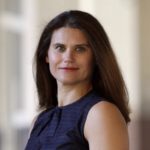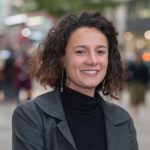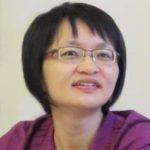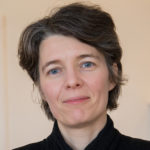PRESIDENT-ELECT

Nina Bandelj is Chancellor’s Professor in the Department of Sociology and Associate Vice Provost for Faculty Development at the University of California, Irvine. She is an economic sociologist interested in the study of money, and how culture, social relations and emotions influence the economy. Growing up in Yugoslavia, and coming of age as Eastern Europe transformed after the fall of the Berlin Wall, inspires Bandelj to connect individuals’ emotions, beliefs and struggles with systemic transformations of communism, capitalism and the global economy. Her books include From Communists to Foreign Capitalists: The Social Foundations of Foreign Direct Investment in Postsocialist Europe (2008), Economy and State: A Sociological Perspective (2010, with E. Sowers), Economic Sociology of Work (2009), The Cultural Wealth of Nations (2011, with F. Wherry), Socialism Vanquished, Socialism Challenged: Eastern Europe and China, 1989-2009 (2012, with D. Solinger) and Money Talks: Explaining How Money Really Works (2017, with F. Wherry and V. Zelizer). Bandelj currently serves as one of the editors of Socio-Economic Review, as Treasurer of the Society for the Advancement of Socio-Economics, and as Vice President of the American Sociological Association.
Click through for more
TREASURER

Yuri Biondi is tenured senior research fellow of the CNRS (National Centre for Scientific Research of France, IRISSO – University Paris Dauphine. Graduate of the Bocconi University of Milan (DES), of the University of Lyon (DEA, PhD), of the University of Brescia (PhD) and of the University of Paris I Sorbonne (HDR), he is founding editor of the Journal “Accounting, Economics and Law: A Convivium”. Yuri has been working with the SASE since 2005, as mini-conference organiser and research network convener for “Accounting Economics and Law.”
He was chairman of the Financial Accounting Standards Committee (FASC) of the American Accounting Association (AAA) from August 2011 to August 2013. His research program combines economics with law and accounting, focusing on the relations between individuals, organisations and institutions in economy, polity and society. His research interests include economic theory, dynamic systems analysis, corporate governance and social responsibility, financial and prudential regulation, accounting theory and regulation, and governmental accounting and finances.
Click through for more
EXECUTIVE COUNCIL
Caroline E. Arnold is an associate professor of Political Science at Brooklyn College, City University of New York. Her interdisciplinary research centers on comparative political economy of development, with a focus on India and Turkey; it brings together approaches from the study of global value chains, historical sociology, and economic history. As a Co-Organizer of Network B, “Globalization and Socio-Economic Development” since 2013, she has worked with her network co-organizers to encourage greater participation from scholars working in the area of political economy of development. In her work as a member of the Executive Council, she has worked to increase dialogue between the council and Network Organizers.
Click through for more

Chiara Benassi is a Senior Lecturer in Human Resource Management at King’s College London. I completed my PhD at the London School of Economics and Political Science and I was a Postdoctoral Fellow at the Max-Planck Institute for the Study of Societies in Cologne.
I am an industrial relations scholar working at the intersection between political economy and sociology of work and employment, with a focus on the effect of the institutional context on union strategies, employer strategies and workers’ outcomes at national, sectoral and workplace level. I apply a multi-level approach to the study of work, linking (changes in) policies and institutions at the national level to workplace outcomes.
Click through for more

Michelle Hsieh is an Associate Research Fellow in the Institute of Sociology, Academia Sinica, Taipei, Taiwan. She received her PhD (in Sociology) from McGill University, Montreal, Canada, and was a Shorenstein Postdoctoral Fellow at the Shorenstein Asia-Pacific Research Center at Stanford University. Her research interests include economic sociology, sociology of development, comparative political economy, and East Asian societies. Her ongoing research explores the variations and consequences of industrial upgrading among the East Asian latecomers. She has done empirical analysis of the different configurations of the state-society linkages for innovation through comparative industry studies on Taiwan and South Korea. Her investigations focus on how technology learning and adaptation take place in a decentralized system of SME network production and the institutional arrangements that can facilitate or hinder coordination and collaboration. Other research interests are the origins of the East Asian developmental state and the connection between technological development and Cold War geopolitics in the latter half of the twentieth century.
Click through for more

Kathryn Ibata-Arens is Vincent de Paul Professor of Political Economy, DePaul University. A scholar of innovation and entrepreneurship, science and technology policy, and economic development, her 2021 book Pandemic Medicine: Why the Global Innovation System is Broken and How We Can Fix It analyzes international competition in new drug discovery and access to essential medicines. Ibata-Arens is also researching the moral economy of patents over living matter. Her 2019 book Beyond Technonationalism: Biomedical Innovation and Entrepreneurship in Asia uses the lens of venture start-up firms in China, India, Japan, and Singapore, finding a new “networked techno-nationalism” guiding national policy and firm-level strategy supporting competitive growth in frontier technologies. In her journal articles, blogs, policy briefings, podcasts, and books, Ibata-Arens employs such methods as historical-institutional, policy and social network analysis, and original fieldwork-based case studies, contextualized within global politics and markets.
Click through for more

Aldo Madariaga is Assistant Professor at the Universidad Diego Portales and associate researcher at the Center for Social Conflict and Cohesion Studies (COES), both in Santiago, Chile. He obtained his PhD from the University of Cologne and the Max Planck Institute for the Study of Societies, where he investigated the political and institutional underpinnings of neoliberalism’s continuity. Based on this research, he published Neoliberal Resilience. Lessons in Democracy and Development from Latin America and Eastern Europe (Princeton University Press, 2020) which received two honorary mentions for the 2020 best book, the Alice Amsden award by SASE, and by the IPE section of the international Studies Association. His current research interests focus on the political economy of economic policy and development, with a particular emphasis on the role of business in diverse policy fields including monetary and industrial policy, skills formation, and environmental policy. He is the principal investigator of the Observatory of Socioeconomic Transformations, a joint ANID (Chilean Research and Development Agency) and Max Planck Institute for the Study of Societies project investigating the politics of ongoing capitalist transformations.
Click through for more

Virág Molnár holds a Ph.D. from Princeton University and is currently a Professor of Sociology at the University of Amsterdam. Before moving to Amsterdam, she was Associate Professor of Sociology at the New School for Social Research in New York. Her research explores the intersections of culture, politics, and social change in Eastern Europe, with special focus on urban culture, the built environment, and material culture. She has written about architecture and state formation in socialist and postsocialist Eastern Europe, the post-1989 reconstruction of Berlin, and the new housing landscape of postsocialist cities. Current projects include a comparative study of emerging markets for street art in New York, Berlin and Budapest; the politics of urban rodent control; and the cultural production of nationalist populism in contemporary Hungary. Her book Building the State: Architecture, Politics, and State Formation in Postwar Central Europe (Routledge, 2013) received the Mary Douglas Prize from the American Sociological Association. She has been a visiting fellow at the Minda de Gunzburg Center for European Studies at Harvard University, the Humboldt Universität in Berlin, the American Academy in Berlin, and the Institute for Advanced Study in Princeton. Her research has been supported by the National Science Foundation, Alexander von Humboldt Foundation, Marie Curie Intra-European Fellowship, and the American Council of Learned Societies, among others.
Click through for more

Dr. Arianna Tassinari is a comparative political economist with an interdisciplinary background spanning across political science, industrial relations, social policy and the sociology of work and labour. Since October 2020, she has worked as a Senior Researcher at the Max Planck Institute for the Study of Societies (Cologne, Germany). Her research investigates patterns of transformation and instability in advanced capitalist economies, with a specific focus on labour politics, industrial relations and labour market policy; the political role of organized producer groups; the impacts of economic crises and technological change on employment relations; and, most recently, the politics of growth models. Her work is primarily comparative in nature, with a specific – but not exclusive – empirical focus on the Southern Eurozone periphery. Arianna obtained her PhD in Industrial Relations from the University of Warwick (UK) in late 2019, and spent time as a visiting researcher at several European institutions including the University of Milan (Italy), University College Dublin (Ireland) and ISCTE-IUL (Portugal). Prior to joining the Max Planck Institute for the Study of Societies, she was a postdoctoral Max Weber Fellow in the Department for Political and Social Sciences at the European University Institute (Florence, Italy). Arianna’s research has appeared in outlets such as Socio-Economic Review, Industrial Relations, the European Journal of Political Research, the European Journal of Industrial Relations, and Work, Employment and Society. Arianna has been an active member of SASE since starting her PhD in 2015. She is dedicated to the promotion of socio-economics as a field of critical, interdisciplinary and pluralist enquiry, and to advancing initiatives tackling issues of gender and racial inequality and under-representation in the field of political economy.
Click through for more

Kevin L Young is Associate Professor in the Department of Economics at the University of Massachusetts Amherst. Kevin’s research focuses on the international political economy of finance and financial regulation, business power and interest group lobbying, and elite networks. He is currently working on a large project on race and gender dynamics among global elite networks, especially among leaderships of large corporations, international organizations and think tanks. Kevin’s work has featured in a variety of journals, including Review of International Political Economy, Global Networks, Journal of European Public Policy, Public Administration, Regulation and Governance, International Studies Quarterly, Socio-Economic Review and others. He is the author (with Thomas Hale and David Held) of Gridlock: Why Global Cooperation is Failing When We Need it Most (Polity, 2013). Kevin was educated in Canada, Germany and the UK, and obtained a Ph.D. from The London School of Economics (LSE) in 2010. He has been a SASE member since 2015 and has been a longtime Steering Committee member of the Progressive Economics Forum, Canada, and is on the incoming Editorial Board of Review of International Political Economy.
Click through for more
|









